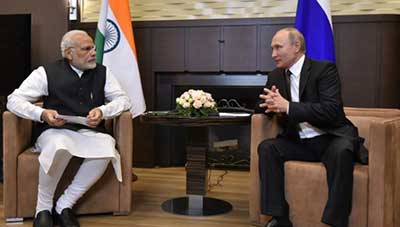Date: 05/01/2023
Relevance: GS-2: Bilateral, regional and global groupings and agreements involving India and/or affecting India’s interests, India and its neighborhood- relations.
Key Phrases: Diplomacy, Ukraine War, Balance Of Power, Multilateralism, First World War, Dominance, Cold War, Bipolar World, Multipolar, Regional Security, G7, G20.
Context:
- For India, the year 2023 is as much about multilateral diplomacy as it is about adapting to a potentially historic shift in great power relations. The endgame of the Ukraine war or the nature of the peace settlement in Ukraine remains the decisive variable in 2023.
Key Highlights:
- The G20 summit will consume India’s diplomatic energies in 2023, but India cannot take its eyes off the significant shifts in great power equations triggered by Russia’s war against Ukraine.
- Three decades of relative harmony among major powers after the end of the Cold War produced significant advances in multilateralism.
- The likelihood of multilateral agreements has decreased as the major nations compete for dominance.
- When great powers cooperate, multilateralism has reasonable chances of success and when they don’t, failure looms large.
Past Is The Key To The Future:
- Major wars have always reshaped great power relations and rearranged the international system. Russia’s war against Ukraine will be no exception.
- The First World War saw the collapse of the Ottoman, Austro-Hungarian,
and Russian empires.
- It also helped the Bolsheviks in Russia form the Soviet Union.
- Gave birth to new nations in Europe.
- Accelerated the rise of Asian nationalism.
- The Second World War accelerated the demise of European colonialism and
heralded the rise of the United States and the Soviet Union as the
“superpowers”.
- United States and Soviet Union managed an armed peace in a divided Europe during the Cold War.
- The process of decolonisation saw the birth of a number of new nations in Asia and Africa.
- The Cold War led to the collapse of the Soviet Union, undid its
sphere of influence in East and Central Europe and led to the rise of the
“unipolar moment”.
- The era of massive economic interdependence that followed the Cold War saw the rapid rise of China and a slower but definitive emergence of India as a major power.
The Russia China Equation:
- Russia and China, which were willing to comply in the unipolar moment in the 1990s, began to assert themselves against the US-led international order in the 21st century.
- Europe focused on strengthening its economic and political integration, and sought greater “strategic autonomy” from the United States.
- They drew steadily closer over the last decade, Russia’s Vladimir Putin and China’s Xi Jinping gambled that the obvious American decline was real and irreversible.
- The political disorder in the West also convinced China to back Russia’s attempt to reorder European regional security order.
- The partnership “without limits” and “no forbidden areas” of cooperation was unveiled less than three weeks before Russia invaded Ukraine on February 24, 2022.
Looming Possibilities:
- Russia’s “special military operation” that was to end in a couple of weeks drags on into 2023, and some cautious conclusions can be drawn.
- First, as the costs of war mount, the case for diplomacy will gain ground in 2023. While both sides talk about peace, they are also gearing up to fight through the harsh winter.
- Second, Russia Putin’s attempts to eliminate Ukraine as an independent nation and roll back the eastward expansion of NATO have backfired. The war has consolidated Ukraine as a nation and NATO has expanded to include Sweden and Finland.
- Third, the war has also demonstrated Europe’s inability to defend itself against Russia despite the EU’s economy being 10 times larger than that of Russia. Europe will remain dependent on the US to defend itself against an expansionist Russia.
- Fourth, the US is emerging as a big winner from the Ukraine war, without being directly involved in the fight, the US is influencing the direction of the war and has leverage in defining the terms of peace in Ukraine.
- Fifth, the US has become a valuable partner for the middle powers
at the receiving end of Russian and Chinese intimidation.
- Russian expansionism in Europe and Chinese aggressiveness in Asia have compelled Germany in Europe and Japan in Asia to boost their defence spending. Poland in Europe and Australia and South Korea in Asia have embarked on ambitious regional security policies.
- Sixth, if China’s initial backing for Russia in Ukraine was a mistake, it has minimised its risks by avoiding armed support to Putin’s war. China is also well placed to benefit from Russia’s Ukraine mistakes by expanding Beijing’s influence in Central Asia.
- Seventh, India that long relied on Russia to provide a regional
balance of power will have to rework its great power sums.
- This should not be too hard, given India’s improving relations with the US and Europe and its focus on diversifying its defence partnerships.
- India, however, will have to move much faster in developing its national capabilities and international partnerships to deter China’s aggressive actions on the border and balance Beijing’s power in the Indo-Pacific.
Conclusion:
- It is unlikely the world will return to the kind of multilateralism that world got used to since the 1990s.
- India’s G20 leadership would be a success if it can prevent the complete breakdown of the multilateral system and generate major power consensus on a few issues.
- Meanwhile, new rules for the global order are beginning to emerge from like-minded groupings like the G7 rather than a deeply divided G20.
Source: The Indian Express
Mains Question:
Q. How global power dynamics are shifting with the Russia-Ukraine war and what challenges it poses for India? Critically Analyze (250 words).






















